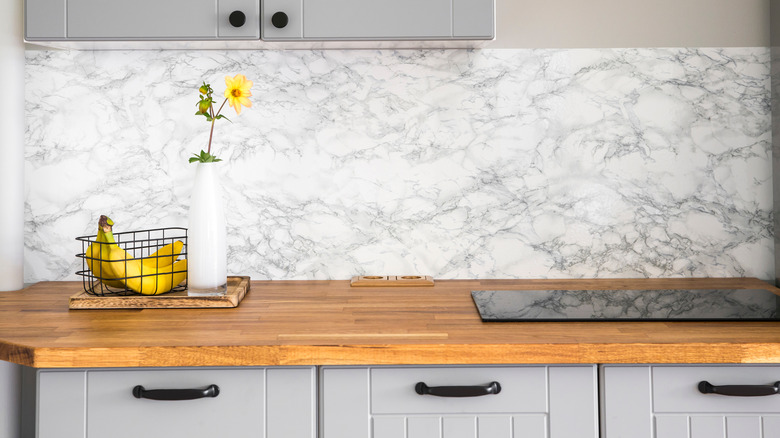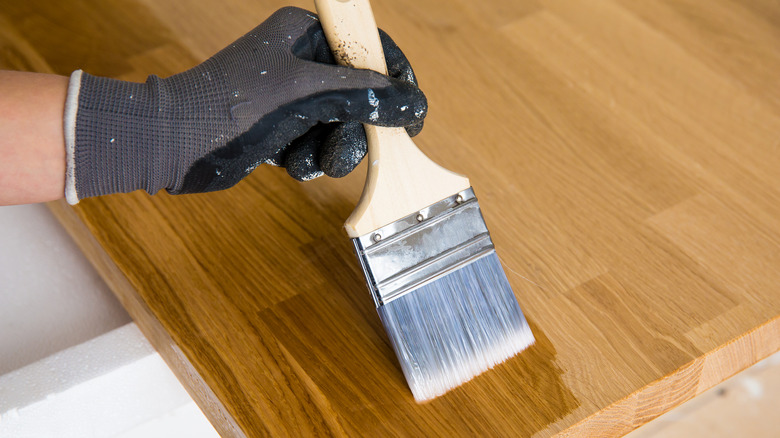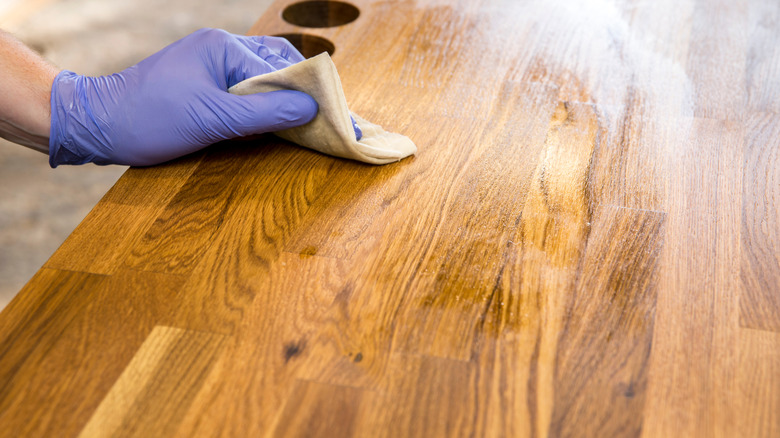How Often You Should Really Be Sealing Butcher Block Countertops
While butcher block countertops might have been a staple in butchers' delis since the mid-1800s, it hasn't been until recently that they have made their way into home kitchens. Over the last decade, butcher block countertops have become a renovation staple thanks to their commercial kitchen aesthetic and ease of use. Not only do they look a little industrial and gourmet, but they can also last up to 20 years, making them a hardworking material for a well-used kitchen. However, while it might be a long-lasting countertop option, it needs to be maintained in order to last two decades, and that means resealing it regularly. But how often should you be doing so? As it turns out, it's quite frequently. You want to reseal your butcher block counters monthly to keep them looking like new.
This helps keep the counters well moisturized, which not only helps them keep their appearance and avoid cracking or splintering but also prevents foods and spills from being absorbed into the wood. This helps keep them looking pristine for years on end, and all you need to do is apply some food-grade mineral oil. However, this frequency isn't necessarily a hard and fast rule since certain factors can demand an increase in wipe-downs. Here's a deeper dive into how often you need to seal your butcher block.
Caveats to the monthly rule
While resealing your wooden countertops monthly is usually sufficient in most cases to keep the butcher block conditioned and protected, certain factors may increase the need for additional wipe-downs. For example, you want to take into account any conditions that typically dry out wood, such as overly cold or hot weather conditions. Wood tends to dry out naturally during the winter thanks to the lack of moisture in the air, so if you live somewhere with long winters, expect to potentially increase sealing during those months to give the wood some extra TLC. But dipping temps aren't the only thing that will make the counters lose their shine. So will air conditioners, so if you have any vents in your kitchen, you may need to reseal those counters more frequently.
Heat also zaps the moisture out of wood, which means your stove top can strip the shine out of the surrounding countertops. If you notice the counters near your cooktop getting lackluster, increase the number of times you seal them. Basically, anytime the sheen wears off, and the wood begins to look dehydrated, it's a good idea to reach for the mineral oil and reseal the surface. To make it part of your routine, consider adding it to your monthly kitchen cleaning tasks, ensuring your countertops stay looking new for as long as possible.
How to seal the countertops
Luckily, sealing them isn't overly involved. All you need is some food-grade mineral oil to keep butcher block countertops looking pristine. It's very important that you get the food-grade version, especially if you plan to chop food directly on your countertops, which is part of the appeal of getting them. This ensures no harmful chemicals are transferred onto the food. Once you have your bottle, pour the mineral oil directly onto the countertop and spread it evenly across the surface. You can just eyeball the amount since the wood will drink in as much oil as it needs and then stop absorbing it once fully saturated. Leave the oil on anywhere from 15 minutes to a day, and then wipe off the excess.
If you would like to take extra steps to protect the wood, you can also include a butcher block conditioner into the mix. Once the oil has soaked in and the excess wiped off, you can add the extra sealant layer, which would be a food-safe organic wax. Rub it in using a microfiber cloth and allow it to sit for five minutes before wiping off any excess. This will help seal the mineral oil and add yet another protective layer to the surface, helping preserve the wood. These two steps will ensure your countertops look brand new for much longer.


